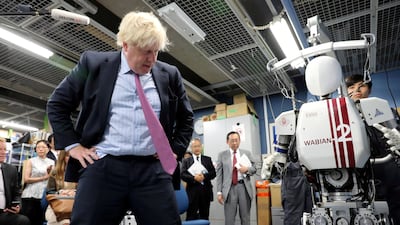British and European officials acknowledged “fundamental divergences” at the end of three days of negotiations on Brexit on Thursday as negotiators addressed some of the thorny issues thrown up by last year’s referendum.
With the clock ticking on the timetable for exit in 2019, the issues of a financial payment to meet Britain’s prior commitments and the rights of citizens, dominated the Brussels talks.
Michel Barnier, the EU chief representative, reminded the British side of Winston Churchill’s aphorism “greatness carries responsibility” as he honed in on the “grave consequences” of the British decision to leave a community it joined in 1973.
The Europeans have demanded that the British bring a clear position to the next round of talks on how much London is committed to pay following its exit. “What we want - and we are working on this - is an orderly withdrawal for the United Kingdom, that’s decided. An orderly withdrawal means accounts must be settled,” he said.
In an effort to show that Britain would remain constructively engaged, his counterpart David Davis hosted Barnier at a lunch in the British embassy. Beforehand Mr Davis was keen to stress that there had been a good start. “Overall I’m encouraged by the progress we have made on understanding each other’s positions,” he said. “We had robust but constructive talks this week. Ultimately getting to a solution will require flexibility from both sides.”
The toughest issue raised so far is how to guarantee any arrangement that would allow the five million plus citizens living either in the EU or in the UK who will be affected by withdrawal.
Brussels demands that the European Court of Justice retains oversight of their rights in Britain. Critics of that position claim this is an extra-territorial claim of that type only exists in the European colonial era in concessions like Shanghai. So far Theresa May has ruled out any role for the court.
Other potential pitfalls in the talks is the right of Britons living in the EU to move between countries on the continent and gain access to subsidised health care. The exchange of criminal record information is also subject to dispute.
Talks on how to preserve trade ties and the Good Friday peace agreement in Ireland made up the third leg of the early talks, though both sides said there had been no progress on the issue.
The gulf between the two sides is as much about preparations as it is about the outstanding issues. A former senior British diplomat, who wrote the Article 50 clause that allowed the British to trigger exit, warned yesterday that his country had forfeited the ability to set the agenda.
John Kerr said the negotiations were taking place on EU-written talking points. “We are negotiating on their text and seem to be saying ‘explain line one, explain line two.’ That is a great pity.”
The British cabinet remains split between ardent Brexiteers who see a free trade opportunity in moving away from the EU and pragmatists who do not wish to disrupt investment and commercial ties.
Liam Fox, the international trade secretary and a hardliner on Brexit, said two sides should strike a free trade agreement but conceded that would not be easy.
“The free trade agreement that we will have to do with the European Union should be one of the easiest in human history,” he said. “We are already beginning with zero tariffs, and we are already beginning at the point of maximal regulatory equivalence, as it is called. In other words, our rules and our laws are exactly the same.
“The only reason that we wouldn’t come to a free and open agreement is because politics gets in the way of economics.”


